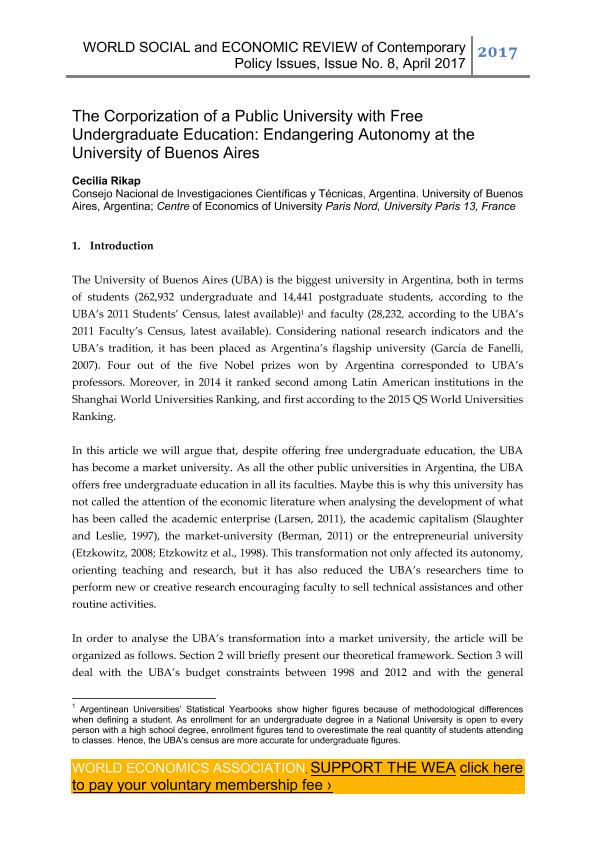Artículo
The corporization of a public university with free undergraduate education: endangering autonomy at the University of Buenos Aires
Fecha de publicación:
04/2017
Editorial:
World Economics Association
Revista:
World social and economic review of contemporary policy issue
ISSN:
2049-3517
Idioma:
Inglés
Tipo de recurso:
Artículo publicado
Clasificación temática:
Resumen
The University of Buenos Aires (UBA) is the biggest university in Argentina, both in terms of students (262,932 undergraduate and 14,441 postgraduate students, according to the UBA’s 2011 Students’ Census, latest available)1 and faculty (28,232, according to the UBA’s 2011 Faculty’s Census, latest available). Considering national research indicators and the UBA’s tradition, it has been placed as Argentina’s flagship university (García de Fanelli, 2007). Four out of the five Nobel prizes won by Argentina corresponded to UBA’s professors. Moreover, in 2014 it ranked second among Latin American institutions in the Shanghai World Universities Ranking, and first according to the 2015 QS World Universities Ranking. In this article we will argue that, despite offering free undergraduate education, the UBA has become a market university. As all the other public universities in Argentina, the UBA offers free undergraduate education in all its faculties. Maybe this is why this university has not called the attention of the economic literature when analysing the development of what has been called the academic enterprise (Larsen, 2011), the academic capitalism (Slaughter and Leslie, 1997), the market-university (Berman, 2011) or the entrepreneurial university (Etzkowitz, 2008; Etzkowitz et al., 1998). This transformation not only affected its autonomy, orienting teaching and research, but it has also reduced the UBA’s researchers time to perform new or creative research encouraging faculty to sell technical assistances and other routine activities.
Archivos asociados
Licencia
Identificadores
Colecciones
Articulos(SEDE CENTRAL)
Articulos de SEDE CENTRAL
Articulos de SEDE CENTRAL
Citación
Rikap, Cecilia Alejandra; The corporization of a public university with free undergraduate education: endangering autonomy at the University of Buenos Aires; World Economics Association; World social and economic review of contemporary policy issue; 8; 4-2017; 44-59
Compartir




